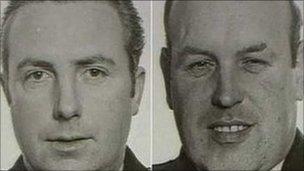Smithwick Tribunal hears about search of IRA man's home
- Published

Ch Supt Harry Breen and Supt Bob Buchanan were murdered by the IRA in 1989
The Smithwick Tribunal has gone into private session to hear about the tapping of the phone of an IRA member.
It is also examining whether the man was tipped off in advance about a search of his home by Irish police.
The tribunal is investigating allegations of Garda collusion in the murders of two senior RUC officers.
Chief Superintendent Harry Breen and Superintendent Bob Buchanan were shot dead in an IRA ambush in south Armagh on 20 March 1989.
At the start of Tuesday's hearing, Mary Laverty, senior counsel for the tribunal, said they were due to hear evidence from a number of Garda officers.
It related to the search of the home of a member of the IRA in January 1990. Police were looking for a forged passport but nothing was found.
Michael Durack, senior counsel for the Garda commissioner, said there were matters arising in this evidence over which the commissioner was claiming privilege and should be dealt with in private.
Mr Durack said the matters were extremely sensitive and he was asking the judge to sit in private so he could make the application, outlining the reasons the evidence should be heard in camera.
Only Judge Smithwick, the tribunal's legal team and counsel for the Garda commissioner were present for that application.
Ch Supt Breen and Supt Buchanan were murdered just minutes after leaving a meeting in Dundalk Garda Station.
Three former Garda officers are being investigated by the tribunal to see if they passed information to the IRA about the meeting. All three deny the allegation.
After hearing the application, the tribunal resumed in public and was told by the judge that he had agreed the evidence should be given in camera.
Sick leave
He said the evidence would relate to January 1990, some time after the murders had been committed and after one of the officers under suspicion had gone on sick leave.
The judge said the information related to the search of the home of a well-known republican.
This man's phone was being tapped and it would seem, the judge said, that the man had been alerted to the fact a search was to take place.
Judge Smithwick said he had ruled that this evidence should be heard in private on a number of grounds.
The media and the public were excluded from the hearing.
- Published2 September 2011
- Published29 June 2011
- Published22 June 2011
- Published21 June 2011
- Published9 June 2011
- Published7 June 2011